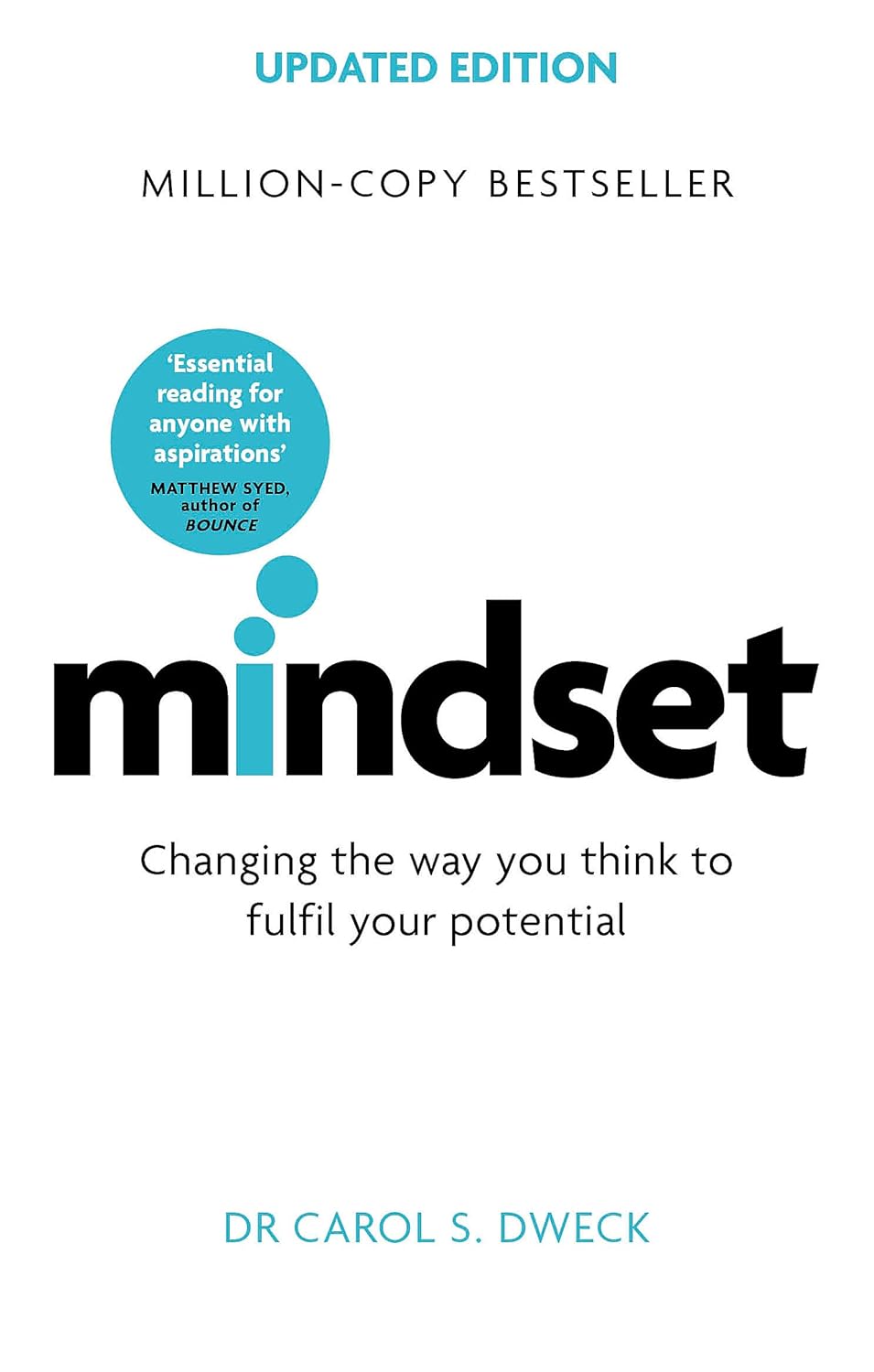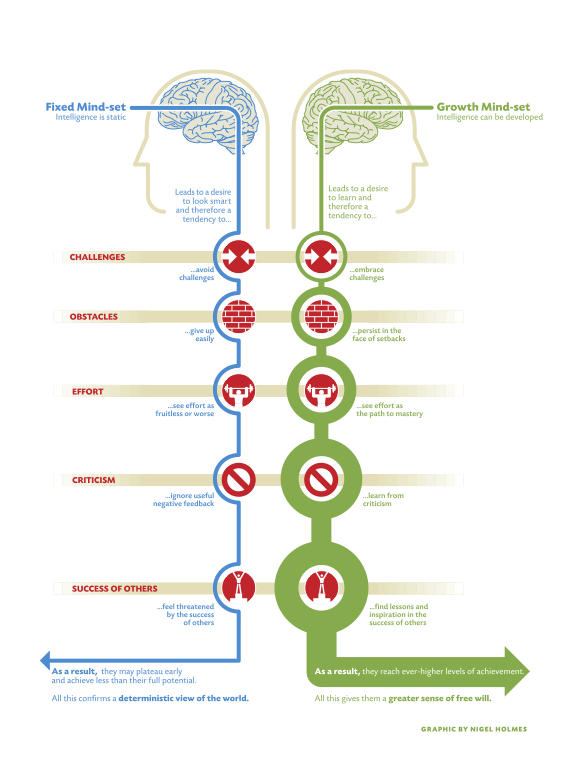Please note that the contents shared here are my own personal notes and highlights from the books I've read. They are neither intended to be comprehensive summaries nor exhaustive explanations of the books. These notes and highlights are simply reflections of the parts that resonated with me the most and serve as a personal reminder of key insights and moments from each book. Curious for more? Browse through my other book notes.
Mindset
Reading this book made me see how our mindsets vary across different parts of our lives. I've identified areas to grow and will follow Dweck's guidance to improve. This book sheds light on facing challenges and shows how to be resilient and adaptable. It motivates us to keep learning and getting better.
The view you adopt for yourself profoundly affects the way you lead your life.
— Carol S. Dweck, Mindset: Changing The Way You Think to Fulfil Your Potential

- It's not always the people who start out the smartest who end up the smartest and or vice versa.
- The view you adopt for yourself profoundly affects the way you lead your life. It can determine whether you become the person you want to be and whether you accomplish the things you value.
- Believing that your qualities are carved in stone—the fixed mindset—creates an urgency to prove yourself over and over.
- The growth mindset is based on the belief that your basic qualities are things you can cultivate through your efforts, your strategies, and help from others.
- Everyone can change and grow through application and experience.
- The passion for stretching yourself and sticking to it, even (or especially) when it's not going well, is the hallmark of the growth mindset.
- People are terrible at estimating their abilities.
- If everything is either good news or bad news about your previous traits—as it is with fixed-mindset people—distortion almost inevitably enters the picture. Some outcomes are magnified, others are explained away, and before you know it you don't know yourself at all.
- Mindsets are just beliefs, they can be changed.
- Intelligence is something you have to work for and put an effort to attain.
- The fixed-mindset people are focused on results, the growth-mindset people are focus on learning.
- People in a growth mindset don't just seek challenge, they thrive on it.
- "This is hard. This is fun."
- It should not be about immediate perfection. It's about learning something over time: confronting a challenge and making progress.
Becoming is better than being.
— Carol S. Dweck, Mindset: Changing The Way You Think to Fulfil Your Potential
- Potential is someone's capacity to develop their skills with effort and coaching over time.
- An assessment at one point in time has little value for understanding someone's ability, let alone their potential to succeed in the future.
- When people with fixed mindset opt for success over growth, they're really trying to prove that they're special. Even superior.
- Lurking behind self-esteem of the fixed mindset is a simple question: If you're somebody when you're successful, what are you when you're unsuccessful?
- Failure has been transformed from an action (I failed) to an identity (I am a failure). This is especially true in the fixed mindset.
- Failure can be a painful experience, but it doesn't define you. For people in growth mindset it's a problem to be faced, dealt with, and learned from.
- Fixed mindset is a dead end.
- People with fixed mindset try to repair their self-esteem after a failure is by assigning blame or making excuses.
- Even geniuses have to work hard for their achievements.
- You can look back and say, "I could have been...," polishing your unused endowments like trophies. Or you can look back and say, "I gave my all for the things I valued." Think about what you want to look back and say. Then choose your mindset.
- People can have different mindsets in different areas.
- People with a fixed mindset prefer effortless success, since that's the best way to prove their talent.
- The growth mindset is the belief that abilities can be cultivated. But it doesn't tell you how much change is possible or how long change will take.
- In the growth mindset, you don't always need confidence. Even when you think you're not good at something, you can still plunge into it wholeheartedly and stick to it.
- ...important achievements require a clear focus, all-out effort, and a bottomless trunk full of strategies—growth mindset.
Creativity is not a magical act of inspiration. It's the result of hard work and dedication.
— Twyla Tharp
- In the fixed mindset, both positive and negative labels can mess with your mind. When you're given a positive label, you're afraid of losing it, and when you're hit with a negative label, you're afraid of deserving it.
- A growth mindset helps people to see prejudice for what it is—someone else's view of them—and to confront it with their confidence and abilities intact.
- If parents want to give their children a gift, the best thing they can do is to teach their children to love challenges, be intrigued by mistakes, enjoy effort, seek new strategies, and keep on learning. That way, their children don't have to be slaves of praise. They will have a lifelong way to build and repair their own confidence.
- Next time you're in a position to discipline your children, ask yourself, What is the message I'm sending here: I will judge and punish you? Or I will help you think and learn?
- The Process: Hard work, trying new strategies, and seeking input from others.
- Willpower is not just a thing you have or don't have. Willpower needs help.

The Journey
- It starts by accepting that we all have both mindsets.
- Then we learn to recognize what triggers our fixed mindset. Failures? Criticism? Deadlines? Disagreements?
- And we come to understand what happens to us when our fixed-mindset "persona" is triggered. Who is this persona? What's its name? What does it make us think, feel, and do? How does it affect those around us?
- Importantly, we can gradually learn to remain in a growth-mindset place despite the triggers, as we educate our persona and invite it to join us on our growth-mindset journey.
- Ideally, we will learn more and more about how we can help others on their journey, too.
It's for you to decide whether change is right for you now. Maybe it is, maybe it isn't. But either way, keep the growth mindset in your thoughts. Then, when you bump up against obstacles, you can turn to it. It will always be there for you, showing you a path into the future.
— Carol S. Dweck, Mindset: Changing The Way You Think to Fulfil Your Potential
If you have comments, feedback, or just want to discuss, join the conversation on X. Reply to the thread here →
This is published on Sun Feb 11, 2024 under Books category.
I write occasional emails about my ventures, thoughts, and discoveries. You'll get first news about launches, behind-the-scenes looks, and honest reflections on my journey - no automation, no fluff.